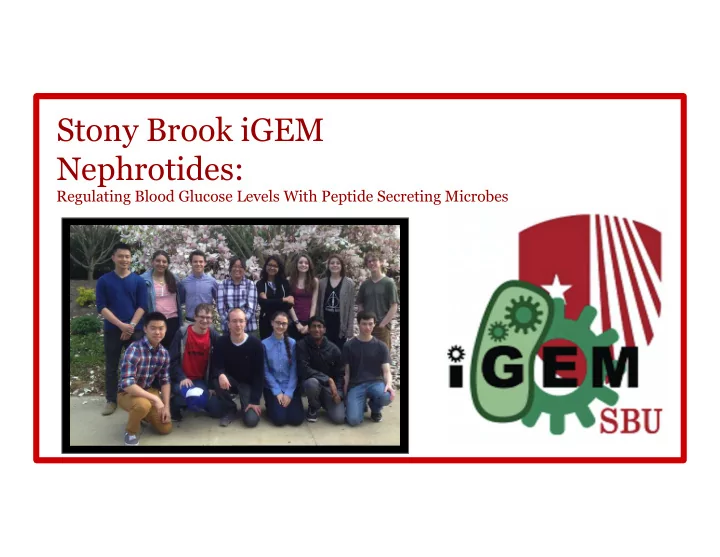

Stony Brook iGEM Nephrotides: Regulating Blood Glucose Levels With Peptide Secreting Microbes "Incidence and Prevalence of Chronic Disease." (MPKB) . Autoimmunity Research Foundation, 2015. Web. 23 Sept. 2015.
Antibiotic Resistance Source: econlife.com
Melittin "Incidence and Prevalence of Chronic Source: "Italian Bee." Disease." (MPKB) . Autoimmunity Research Foundation, Wikipedia . Wikimedia 2015. Web. 23 Sept. 2015. Foundation, n.d. Web. 21 Sept. 2015. Source: SBU iGEM 2014
Melittin Optimization "Incidence and Prevalence of Chronic Disease." (MPKB) . Autoimmunity Research Foundation, 2015. Web. 23 Sept. 2015.
Infectious Disease vs. Chronic Disease in the US "Incidence and Prevalence of Chronic Disease." (MPKB) . Autoimmunity Research Foundation, 2015. Web. 23 Sept. 2015. "Incidence and Prevalence of Chronic Disease." (MPKB). Autoimmunity Research *Compiled from data conducted by David S. Jones, M.D., Ph.D., Scott H. Podolsky, M.D., and Jeremy A. Greene, M.D., Ph.D. at Harvard Foundation, 2015. Web. 23 Sept. 2015. Medical School in The Burden of Disease and the Changing Task of Medicine.
Type II Diabetes "Incidence and Prevalence of Chronic Disease." (MPKB) . Autoimmunity Research Foundation, 2015. Web. 23 Sept. 2015.
Sodium Glucose Transporter 1 and 2 Proximal Tubule Blood Lumen Na+ Na/K SGLT1 ATPase Glucose K+ SGLT2 Na+ GLUT2 "Incidence and Prevalence of Chronic Disease." (MPKB) . Autoimmunity Research Foundation, 2015. Web. 23 Sept. 2015. Based on: Wilding, John P.H. "SGLT2 Inhibitors for the Treatment of Diabetes." MedScape Multispecialty. Medscape, LLC, 3 July 2009. Web. 23 Sept. 2015.
Glutamine-Serine-Proline (QSP) without tripeptides with QCPac* QSP has the same AMG uptake [% of control] functionality as QCP. "Incidence and Prevalence of Chronic Disease." (MPKB) . Autoimmunity Research Foundation, 2015. Web. 23 Sept. 2015. Source: Vernaleken, A., et. al.”Tripeptides…”
Project Overview Solute Active Tripeptide Cleaver 2 EnvZ Cell Sensor Cell 1 Oligopeptides OmpA HlyA "Incidence and Prevalence of Chronic Disease." (MPKB) . Autoimmunity Research Foundation, Proline Iminopeptidase System 2015. Web. 23 Sept. 2015.
The Sensor "Incidence and Prevalence of Chronic Disease." (MPKB) . Autoimmunity Research Foundation, 2015. Web. 23 Sept. 2015.
The Secretion System "Incidence and Prevalence of Chronic Disease." (MPKB) . Autoimmunity Research Foundation, Source: Pbase.com 2015. Web. 23 Sept. 2015. Dalbey, Ross E., and Andreas Kuhn. "Protein Traffic in Gram- negative Bacteria – How Exported and Secreted Proteins Find Their Way." Oxford University Press (2012): n. pag. 1 Nov. 2012. Web. 23 Sept. 2015.
Construct Design Oligopeptides "Incidence and Prevalence of Chronic Disease." (MPKB) . Autoimmunity Research Foundation, 2015. Web. 23 Sept. 2015. Membrane Secretion
Peptide Production OmpC Antibiotic Resistance Ladder Peptides Negative Peptides Peptides Negative 1:2 Control 1:5 1:10 Control "Incidence and Prevalence of Chronic Disease." (MPKB) . Autoimmunity Research Foundation, 2015. Web. 23 Sept. 2015.
The Protease "Incidence and Prevalence of Chronic Disease." (MPKB) . Autoimmunity Research Foundation, 2015. Web. 23 Sept. 2015. Proline Endopeptidase Proline Iminopeptidase Source: Protein Data Base Source: European Protein Data Base
Protease Construction Proline Iminopeptidase "Incidence and Prevalence of Chronic Disease." (MPKB) . Autoimmunity Research Foundation, 2015. Web. 23 Sept. 2015. Membrane Displayed Proline Iminopeptidase
Sensor Design (cAMP Sensor)
Sensor Design (Insulin-SLN1 Chimera) ● Successful fusion of various tyrosine kinase receptor ligand binding domains (Pacifi, et. al). ● Successful fusion of Human Epidermal Growth Factor Receptor ligand binding region with intracellular region of SLN1 (Ostrander, et. al). I-TASSER Generated Chimera Model
Community Involvement
Collaboration: University of Georgia Atlantic iGEM team
Outreach
Educating the Future Generation
Human Practices Mind Map Skeptical of using Under informed of Fear genetically E.coli to treat disease engineered synthetic biology organisms techniques "Incidence and Prevalence of Chronic Disease." (MPKB) . Autoimmunity Research Foundation, 2015. Web. 23 Sept. 2015.
Human Practices "Incidence and Prevalence of Chronic Harlod Carlson, MD Disease." (MPKB) . Autoimmunity Research Foundation, 2015. Web. 23 Sept. 2015. Chairman of IRB Human Source:"Biblioguide En Thérapie Génique." Ecole Polytechnique Federale Practices Institutional De Lausanne . EPFL, n.d. Web. 14 Sept. Review Board 2015.
Further Research • Test the system in vitro • Test the system in vivo in mice
In Summary ● Our ¡system ¡is ¡an ¡insulin ¡independent ¡treatment ¡for ¡type ¡two ¡diabe4c ¡ pa4ents ¡ ● The ¡glucose ¡sensor ¡creates ¡a ¡responsive ¡medicine ¡produc4on ¡system ¡ in ¡vivo ¡ ● Encapsula4on ¡of ¡engineered ¡cells ¡allows ¡for ¡a ¡contained ¡and ¡safe ¡ delivery ¡system ¡in ¡conjunc4on ¡with ¡pa4ent ¡needs ¡
Special Thanks To Faculty Advisers Acknowledgements The following departments of Stony Brook University: John Peter Gergen, Ph.D. � Department of Undergraduate Biology Gabor Balazsi, Ph.D. � Department of Biochemistry and Cell Kevin Czaplinski, Ph.D. Biology Ete Chan, Ph.D. � Department of Biomedical Engineering Joshua Rest, Ph.D. � Department of Evolution and Ecology Yizhi Meng, Ph.D. � Department of Pharmacological Sciences Department of Pathology � Undergraduate � Office of Scientific Affairs Advisers � Stony Brook Laufer Center Janki Patel � Undergraduate Research & Creative Nicolai Alexandre Aquino Activities Tayco Harold Carlson, M.D. "Incidence and Prevalence of Chronic Gurkamal Kaur Steven Glynn, Ph.D. Disease." (MPKB) . Autoimmunity Research Foundation, 2015. Web. 23 Sept. 2015. Helen Liu Wali Karzai, Ph.D. David Thanassi, Ph.D. Jessica Seeliger, Ph.D. Markus Seeliger, Ph.D. Marvin O'Neal, Ph.D.
Recommend
More recommend